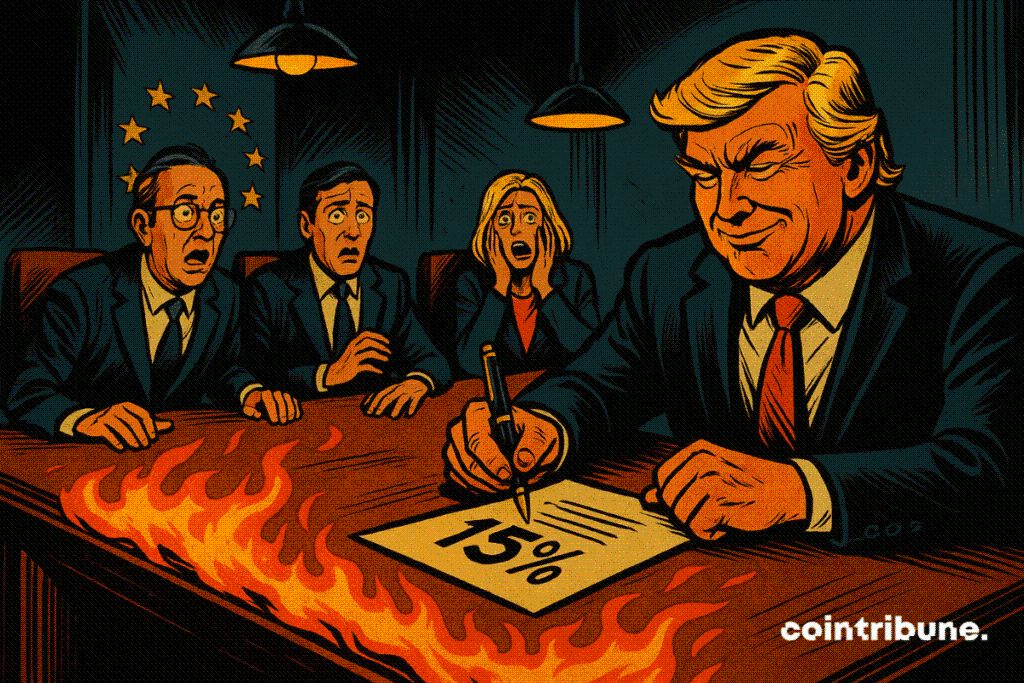Trump Sets 15 % Tariff Floor For EU Imports
As the lines of global trade are redrawn under geopolitical pressure, Donald Trump lays his cards on the table. Ahead of a meeting in Scotland with Ursula von der Leyen, the American president warns: no customs tariff below 15 % will be granted to the European Union. This firm stance, with direct repercussions on transatlantic flows, could also impact strategic sectors such as digital technology and blockchain. Behind this maneuver is an economic showdown between two opposing visions of commercial sovereignty.

In Brief
- Donald Trump announces that the European Union will not benefit from customs duties lower than 15 % on its exports to the United States.
- This declaration comes ahead of a crucial meeting with Ursula von der Leyen in Scotland.
- The American president adopts a firm stance, mentioning a ‘very powerful’ agreement on his terms.
- Some sectors, such as pharmaceuticals, are explicitly excluded from the trade agreement.
A Hard Line Displayed : Trump Closes the Door to Any Tariff Flexibility
During a speech on Sunday, July 27, Donald Trump clearly indicated that the European Union would not benefit from preferential customs terms in trade with the United States, while Europe had threatened Washington with an unprecedented economic war .
Before an anticipated meeting with Ursula von der Leyen, President of the European Commission, the American president issued a blunt warning : “the EU will not benefit from customs duties below 15 %”.
This message was delivered just hours before discussions in Scotland, in a context marked by the return of transatlantic trade tensions. Furthermore, Trump emphasized the strategic dimension of his approach, describing the forthcoming agreement as “very powerful, very large, the biggest of all agreements”.
Several key elements emerge from this declaration, setting a clear framework for negotiations :
- The announced tariff floor : no European product exported to the United States would be subject to customs duties lower than 15 % ;
- A stated sectoral exclusion : “pharmaceutical products will not be part of this trade agreement”, Trump specified, implying that they would be treated separately ;
- The imposed negotiation deadline : august 1st is fixed for all parties, adding significant time pressure on the EU ;
- A hard diplomatic stance : Trump does not talk about compromise but about a head-on power struggle where the terms are dictated by the United States.
This declaration marks a sharp break from the more flexible approaches of his predecessors. It also reflects a desire to redefine economic relations with Europe on less cooperative and more transactional terms. In this context, the EU faces a binary choice : submit to American conditions or risk a direct trade conflict.
The Shadow Cast on the European Digital Economy
Beyond the tariff question, Donald Trump introduced a new parameter by mentioning the probability of a comprehensive trade agreement with the EU. “I would say 50/50, a 50-50 chance of concluding a deal”, he indicated, adding uncertainty that could further destabilize transatlantic relations.
This deliberate ambiguity fits within a tough negotiation strategy, where the prospect of no agreement is as credible as that of a compromise. Trump insisted on the universality of the deadline: “The August 1st deadline is the same for everyone”, reinforcing the idea of maximum pressure on his European counterparts. Through these statements, the message is clear : it is the United States that now sets the rules of the game.
This firmness raises questions about the future of European economic sectors closely linked to the American market, notably the technology and digital ecosystem. Companies like Ledger (crypto wallet), sovereign cloud providers, and European blockchain solution providers risk seeing their costs to access the American market rise sharply.
This could weaken their competitiveness against American rivals enjoying a protected domestic market. Transatlantic cooperation projects in asset tokenization, stablecoin regulation , or the implementation of Web3 infrastructures could also suffer from this climate of instability.